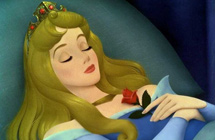史上最傻瓜减肥法——睡美人减肥法
|
If you’re sleeping, you’re not eating. That’s basically the main idea behind the Sleeping Beauty Diet, an increasingly popular weight loss method that encourages people to take sedatives in order to sleep for up to 20 hours a day and skip meals. It’s hard to even consider the Sleeping Beauty Diet an actual diet, because it doesn’t prescribe the things you should eat those you should avoid. Instead, it just recommends a lot less eating and whole lot of sleeping. Advocates claim that apart from the obvious “benefit” of reducing calorie intake, this controversial weight-loss method also takes advantage of our bodies’ ability to regulate our metabolism through sleep, which accelerates weight-loss even more. However, there isn’t a lot of science that supports this theory, and even if there were, the risks of undergoing such an extreme regimen still outweigh the benefits by quite a large margin.
The most dangerous aspect of the Sleeping Beauty Diet is the use of sedatives, most commonly benzodiazepines like diazepam (Valium) and alprazolam (Xanax), to force the brain to sleep a lot more than it needs to. No matter how much you enjoy sleeping, it’s unlikely that you can do it naturally for 20 hours out of 24, without the use of medication. This opens you up to all kinds of risks, from possible overdoses to addiction, which can be very hard to beat. “If people have to rely on medications to produce sleep—particularly [meds] like benzodiazepines, which are addictive—it’s putting the person at risk of addiction,” Dr. Tracey Wade, a professor at the Flinders University School of Psychology, told VICE Broadly. “It’s not only getting the body to sleep more than it needs to; they’ll also have to use higher and higher dosage levels to get the desired effect.” But there’s also the effects such long periods of sleep can have on your social life and mental health. Never mind being constantly sedated and disoriented, not having the time or the focus to do virtually anything, but the social aspect of one’s life can be seriously impacted at all. If all you do is sleep, you become increasingly isolated and depression is likely to set in after a while. And, as Dr. Wade points out, “we know that depression also triggers disordered eating. It sounds like it would actually just push people more firmly into the vicious cycle that the eating disorder creates.” Believe it or not, the Sleeping Beauty Diet has apparently been around for decades. The first reference of it can be traced back to 1966, in in Jacqueline Susann’s best-selling novel, Valley of the Dolls, where protagonists would take sedatives and check themselves into “Swiss sleep clinics” to lose weight. It is rumored that even Elvis Presley used it during the 70s, when he needed to fit his iconic costumes. The Sleeping Beauty Diet has seen a resurgence recently, especially on pro-anorexia blogs and forums, where it’s being promoted as a surefire way to lose weight. One forum user describes it as “perfect for the end of the school semester,” and recommends a 14-day fasting period, on top of an extra 10 hours sleep per day. “I just take some really strong pain killers they usually dope me out and I’ll nap for hours. They kind [of] mess with your stomach and curb your hunger a bit so I do it all the time,” another person wrote. “I love sleeping to avoid food. It’s pretty easy for me because I’m tired ninety-nine percent of the time.” Dr. Wade admits that the Sleeping Beauty Diet may seem easy and appealing, especially to someone who is already depressed and caught up in the vicious cycle of an eating disorder, but points out that the results are unlikely to be as impressive as they think. “It’s just like a low calorie diet, which slows down the metabolism anyway. The body will demand more food and it’s very likely that binge eating, in the waking hours, will result,” she says. |









